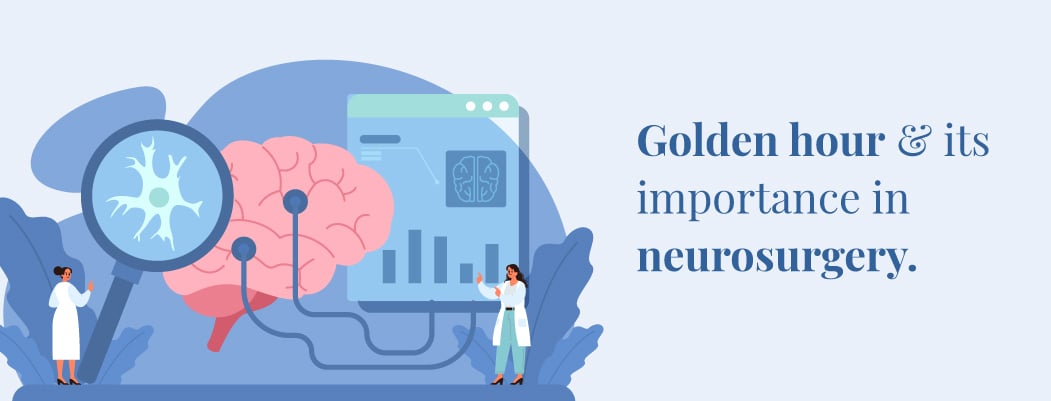What is Golden hours in Neurosurgery ?
March 25, 2023

Overview
Neurosurgery is a complex medical discipline that deals with the diagnosis, treatment, and management of various neurological disorders and injuries. One of the critical aspects of neurosurgery is the concept of the “Golden Hour,” which refers to the crucial time window during which immediate medical attention and intervention can significantly improve the outcome of patients with severe brain injuries.
What is the Golden Hour in Neurosurgery?
The Golden Hour in neurosurgery is the period of time that starts from the moment a patient suffers a severe brain injury and ends one hour after the injury. This time frame is critical because it represents the optimal window of opportunity to provide immediate medical attention and intervention, which can significantly improve the chances of survival and recovery. During this period, the brain experiences a series of metabolic and physiologic changes that can exacerbate the extent of the injury and lead to irreversible damage or death. Therefore, early diagnosis, rapid stabilisation, and prompt treatment are essential to minimise the extent of brain damage and improve the outcome of the patient.
Why is the Golden Hour Important in Neurosurgery?
The Golden Hour is crucial in neurosurgery for several reasons:
- The brain is a highly metabolically active organ that requires a constant supply of oxygen and glucose to function correctly. When the brain experiences trauma or injury, its metabolic demands increase, leading to a cascade of chemical reactions that can cause secondary damage to the brain tissue. This process is known as secondary injury, and it can worsen the initial injury and lead to irreversible brain damage. Therefore, prompt medical attention and intervention can help minimize the secondary injury and improve the outcome of the patient.
- The Golden Hour is critical because it represents the time frame during which the patient is most vulnerable to life-threatening complications such as bleeding, swelling, and increased intracranial pressure (ICP). These complications can rapidly escalate and lead to severe brain damage or death if not promptly identified and managed. Therefore, early diagnosis and rapid stabilization are crucial to prevent or mitigate the impact of these complications.
- During the Golden Hour, the patient’s physiological parameters, such as blood pressure, heart rate, and oxygen saturation, may fluctuate rapidly, indicating the severity of the injury and the need for immediate intervention. Monitoring these parameters and responding promptly to any abnormalities is essential to ensure optimal patient care and prevent further brain damage.
- The Golden Hour is also important because it provides an opportunity for the medical team to gather critical information about the patient’s medical history, the circumstances surrounding the injury, and any preexisting medical conditions that may affect thetreatment plan. This information can help guide the diagnosis and treatment process and ensure that the patient receives the most appropriate and effective care.
Limitations of the Golden Hour in Neurosurgery
While the Golden Hour is crucial in neurosurgery, it is important to note that it is not a hard and fast rule. The time window may vary depending on various factors, such as the type and severity of the injury, the age and overall health of the patient, and the availability of medical resources. Therefore, it is essential to use the Golden Hour as a general guideline rather than a strict rule and to tailor the treatment plan to the individual needs and circumstances of the patient.
In addition, the Golden Hour may be challenging to implement in certain settings, such as in remote or under-resourced areas, where access to specialized medical care and resources may be limited. In these situations, it is essential to prioritize the most critical interventions and stabilize the patient before transferring them to a higher level of care.
Best Practices for Ensuring Optimal Patient Care during the Golden Hour
To ensure optimal patient care during the Golden Hour in neurosurgery, the following best practices should be observed:
- Rapid Assessment and Diagnosis: Time is of the essence during the Golden Hour, and rapid assessment and diagnosis are critical to identifying the extent of the injury and initiating appropriate treatment. The medical team should prioritize the most life-threatening conditions, such as bleeding or swelling, and quickly stabilise the patient before conducting further diagnostic tests.
- Stabilisation: Stabilizing the patient is a crucial step in preventing or mitigating the impact of life-threatening complications such as bleeding, swelling, or increased ICP. This may involve measures such as controlling blood pressure, administering oxygen, or performing surgical decompression.
- Collaborative Multidisciplinary Care: Neurosurgery is a highly specialized field that requires a collaborative multidisciplinary approach to provide optimal patient care. The medical team should consist of neurosurgeons, neurologists, critical care physicians, nurses, and other healthcare professionals who work together to provide comprehensive and coordinated care.
- Use of Evidence-Based Treatment Protocols: Evidence-based treatment protocols should be used to guide the diagnosis and treatment process during the Golden Hour. These protocols should be based on the latest scientific evidence and tailored to the individual needs and circumstances of the patient.
- Continuous Monitoring and Reassessment: Continuous monitoring and reassessment of the patient’s vital signs, neurological status, and response to treatment are crucial during the Golden Hour. This can help identify any changes in the patient’s condition and guide further treatment decisions.
Summary
The Golden Hour is a critical concept in neurosurgery that highlights the importance of prompt medical attention and intervention in improving the outcome of patients with severe brain injuries. During this period, the brain experiences a series of metabolic and physiologic changes that can worsen the extent of the injury and lead to irreversible damage or death. Therefore, early diagnosis, rapid stabilisation, and prompt treatment are essential to minimise the extent of brain damage and improve the outcome of the patient. While the Golden Hour is not a strict rule, it provides a general guideline for healthcare professionals to optimise patient care and ensure the best possible outcomes. By following best practices such as rapid assessment and diagnosis, collaborative multidisciplinary care, and continuous monitoring and reassessment, neurosurgeons can provide optimal care to patients during the Golden Hour in neurosurgery.
People also ask
1. What is the concept of golden hour?
The concept of the golden hour refers to a critical time period in emergency medical care when prompt medical attention can significantly improve the chances of survival and reduce the risk of long-term complications or disability. This term is used to describe the crucial first hour after a traumatic injury.
2. What is the golden hour in head injury?
The golden hour in head injury is the first hour after a traumatic brain injury occurs. During this period, immediate medical attention is crucial to prevent further brain damage and improve the patient’s chances of survival. In head injury cases, the golden hour is particularly important because brain injuries can cause swelling or bleeding, which can lead to increased pressure on the brain and more damage.
3. What is the importance of the golden hour?
The importance of the golden hour is that it provides a critical time window during which prompt medical attention can significantly improve the chances of survival and reduce the risk of long-term complications or disability. In cases of trauma, the first hour after the injury is often the most crucial, and the decisions and actions taken during this time can have a significant impact on the patient’s outcome. The golden hour emphasizes the importance of rapid response and immediate medical attention to minimize the damage caused by an injury and improve the patient’s chances of recovery.








